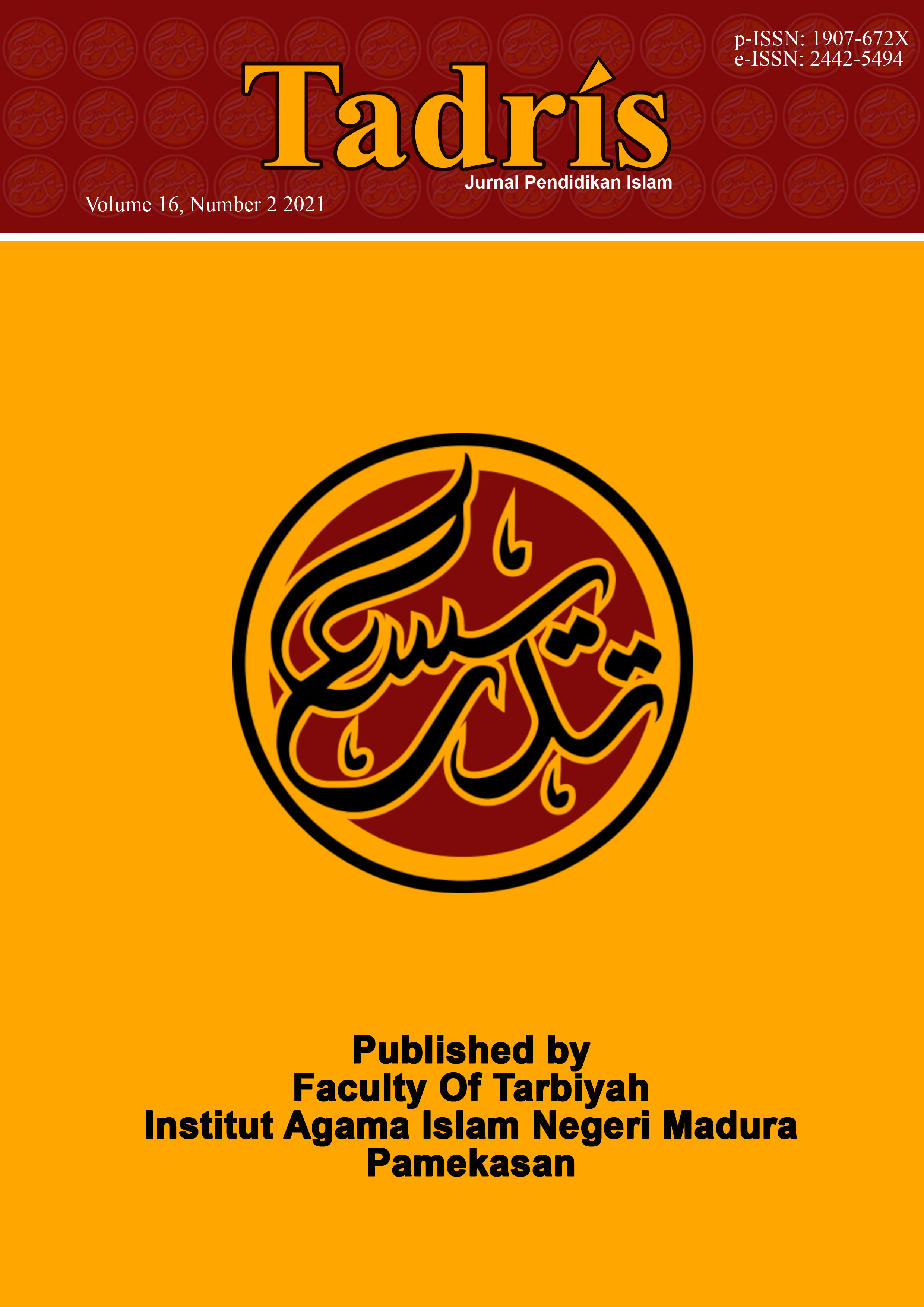The implementation of KH. Hasyim Asy’ari Thought About Educators Ethics
 Abstract views: 363
,
Abstract views: 363
,
 PDF downloads: 275
PDF downloads: 275
Abstract
Ethic is important aspect in Islamic education. It’s existence is needed because it plays significant role to achieve the Islamic education goals. KH. Hasyim Asy’ari thinking about ethics educator starting from himself so well behaved. Then, taught the students when learning takes place. According of them, the educational purpose in every human being is to be a full human being in order to get closer to the Creator and get the happiness of the world and the hereafter. In the book Adab al-Alim wa al-Muta’alim, KH. Hasyim Asy’ari mention moralethical values should be the design of the people living in the world. So that a seeker of knowledge embody knowledge in everyday life with the behavior of resignation, wara’, the charity would please Allah, grateful and so on.
Downloads
References
AH, H., & Sanaky. (2003). Paradigma Pendidikan Islam Membangun Masyarakat Madani Indonesia. Yogyakarta: Safiria Insania Press.
Al-Rasyidin, & Nizar, S. (2005). Filsafat Pendidikan Islam. Jakarta: Ciputat Press.
AM, S. (1996). Interaksi dan Motivasi Belajar Mengajar. Jakarta: Rajawali Press.
Asy`ari, H. (n.d.). Adab al-`Alim wa al-Muta`allim. Jombang: Maktabah al-Turats al-Islami.
Bialik, M., & Fadel, C. (2015). Skills for the 21st Century: What Should Students Learn? Center for Curriculum Redesign. Boston: Massachusetts.
Buhanuddin. (2001). Akhlak Pesantren Pandangan KH. Hasyim Asy`ari. Yogyakarta: Ittaqa Press.
Dwi Pamuji, U., Waring, R., & Kurniawan, E. (2019). EFL Teachers’ Experiences in Developing L2 Proficiency Through Extensive Listening. Journal, 30(2), 259–260. Retrieved from http://dx.doi.org/10.15639/teflinjournal.v30i2/257-273
Freire, P. (2000). Pendidikan Kaum Tertindas, terj. Otomo Dananjaya. Jakarta: LP3ES.
Hamid Muhammad bin Muhammad Al-Ghazali, A. (n.d.). Ihya’ Ulum Ad-Din (Juz I). Saudi Arabia: Dai al-Ihya’.
Imam Barnadib, S. (1995). Pengantar Ilmu Pendidikan Sistematis. Yogyakarta: Andi Offset.
Muchsin, B., & Siswandari, S. (2020). Lass Culture and The Academic Stress of Digital Natives Generations. Cakrawala Pendidikan: Jurnal Ilmiah Pendidikan, 39(1), 235. Retrieved from https://doi.org/10.21831/cp.v39i1.26910.
Nata, A. (1996). Akhlak Tasawuf. Jakarta: Rajawali Pers.
Ratini, R., Muchtar, H., A. Suparman, M., H.Tamuri, A., & Susanto, E. (2018). The Influence of Learning Models and Learning Reliance on Students’ Scientific Literacy. Indonesian Journal of Science Education, 7(4), 448–449. Retrieved from https://doi.org/10.15294/jpii.v7i4.12489.
Richardson, E., & M. Kelly, R. (2011). Piaget and Bruner: Can they help the technical teacher? The Clearing House. A Journal of Educational Strategies, 84(5). Retrieved from https://doi.org/10.1080/03057877280000191
Rifai, M. (2010). K.H. Hasyim Asy’ari. Yogyakarta: Ar-Ruzz Media Group.
Soekanto, S. (1997). Sosiologi: Suatu Pengantar. Jakarta: Rajawali Press.
Sukri, A., A. Rizka, M., G. Sakti, H., U. Maududy, K., & Hadiprayitno, G. (2018). Designing an Integrated Curriculum Based on Local Primacy and Social Reconstruction Perspectives of West Nusa Tenggara, Indonesia. Indonesian Journal of Science Education, 4(4), 471. Retrieved from https://doi.org/10.15294/jpii.v7i4.15272
Suseno, F. M. (1987). Etika Dasar. Yogyakarta: Kanisius.
T. Lawton, J., A. Saunders, R., Muhs Child, P., & Fam. (2012). Theories of Piaget, Bruner, and Ausubel: Explications and Implications. The Journal of Genetic Psychology Research and Theory on Human Development, 136(1), 123. Retrieved from https://doi.org/10.1080/00221325.1980.10534102.
Tambak, S., & Sukenti, D. (2020). Strengthening Islamic Behavior and Islamic Psychosocial in Developing Professional Madrasah Teachers. Cakrawala Pendidikan: Jurnal Ilmiah Pendidikan, 39(1). Retrieved from https://doi.org/10.21831/cp.v39i1.26001
Tilaar, H. (2000). Paradigma Baru Pendidikan Nasional. Jakarta: Rineka Cipta.
Copyright (c) 2021 TADRIS: Jurnal Pendidikan Islam

This work is licensed under a Creative Commons Attribution-NonCommercial 4.0 International License.
The journal operates an Open Access policy under a Creative Commons Non-Commercial 4.0 International license. Authors who publish with this journal agree to the following terms:
- Authors retain copyright and grant the journal right of first publication with the work simultaneously licensed under a
 Commons Attribution-NonCommercial 4.0 International License
Commons Attribution-NonCommercial 4.0 International Licensethat allows others to share — copy and redistribute the material in any medium or format, and adapt — remix, transform, and build upon the material.
- Authors are able to enter into separate, additional contractual arrangements for the non-exclusive distribution of the journal's published version of the work (e.g., post it to an institutional repository or publish it in a book), with an acknowledgement of its initial publication in this journal.
- Authors are permitted and encouraged to post their work online (e.g., in institutional repositories or on their website) prior to and during the submission process, as it can lead to productive exchanges, as well as earlier and greater citation of published work (see The Effect of Open Access).














